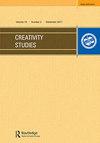关于 Mykhailo Starytsky 和 Mykola Lysenko 创作活动中的民俗及其对乌克兰专业音乐和戏剧院的形成的影响
Q1 Social Sciences
引用次数: 0
摘要
本文专门研究乌克兰剧作家、作家、诗人、翻译家、戏剧和文化名人、导演、慈善家、乌克兰第一家专业剧院(所谓的 "名人剧院")导演米哈伊洛-斯塔里茨基(Mykhailo Starytsky,1840-1904 年)和乌克兰民族歌剧创始人、作曲家、钢琴家、指挥家、民俗学家、公众人物米科拉-李森科(Mykola Lysenko,1842-1912 年)的民俗活动。主要关注对剧作家使用乌克兰人的仪式、习俗、传统、民间道德描述的分析,以及使用小型民间体裁、措辞的例子。研究发现,19 世纪下半叶乌克兰社会对民间传统的研究和保护在形成民族自我认同和民族意识方面发挥了重要作用。确定了斯塔里茨基作品中民族志的起源、特点和作用,特别是证明了剧作家使用基督教和前基督教仪式的描述主要是为了真实地反映乌克兰传统社会的形象,其中一个重要组成部分是古代仪式、游戏、音乐和戏剧表演。作品展示了民间历法冬夏周期的仪式是如何以各种方式反映在艺术家的作品中的,其中以各种明快的仪式和习俗最为饱和。事实证明,对民间音乐的研究对作曲家的创作产生了重大影响。事实证明,斯塔里茨基和李森科作品中的民间传说对乌克兰专业戏剧音乐和戏剧的形成产生了积极影响。本文章由计算机程序翻译,如有差异,请以英文原文为准。
ABOUT FOLKLORE IN THE CREATIVE ACTIVITY OF MYKHAILO STARYTSKY AND MYKOLA LYSENKO AND ITS INFLUENCE ON THE FORMATION OF THE UKRAINIAN PROFESSIONAL MUSIC AND DRAMA THEATER
The article is devoted to the study of folklore activities of Ukrainian playwright, writer, poet, translator, theatrical and cultural figure, director, philanthropist, director of the first Ukrainian professional theater, the so-called “theater of luminaries”, Mykhailo Starytsky (1840–1904) and the founder of the Ukrainian national opera, composer, pianist, conductor, folklorist, public figure Mykola Lysenko (1842–1912). The main attention is paid to the analysis of the playwright’s use of descriptions of rituals, customs, traditions, folk morals of Ukrainians, as well as examples of the use of small folk genres, phraseology. It was found that for the Ukrainian community the study and preservation of folk traditions in the second half of the 19th century played an important role in the formation of national self-identification and national consciousness. The origins, features and functions of ethnography in Starytsky’s works are determined, in particular it is proved that the playwright’s use of descriptions of Christian and pre-Christian rites was primarily aimed at a true image of traditional Ukrainian society, an important component of which were ancient rituals, games, music and drama actions. It is shown how the rites of the winter and summer cycles of the folk calendar are reflected in various ways in the artist’s work, which is the most saturated with various bright rituals and customs. It is proved that the study of folk music significantly influenced the composer’s creativity. It is confirmed, that folklore in the works of Starytsky and Lysenko had a positive effect on the formation of the Ukrainian professional theater as a music and drama one.
求助全文
通过发布文献求助,成功后即可免费获取论文全文。
去求助
来源期刊

Creativity Studies
Social Sciences-Cultural Studies
CiteScore
3.20
自引率
0.00%
发文量
38
审稿时长
15 weeks
期刊介绍:
Creativity Studies accepts original research articles with a focus on communication within the creative society. The journal welcomes contributions from scholars from diverse disciplines such as philosophy, sociology, history, political, communication and information sciences. Creativity Studies also publishes survey papers and descriptions of academic events in this area. The journal issues will be organized around different issues on creativity.
 求助内容:
求助内容: 应助结果提醒方式:
应助结果提醒方式:


